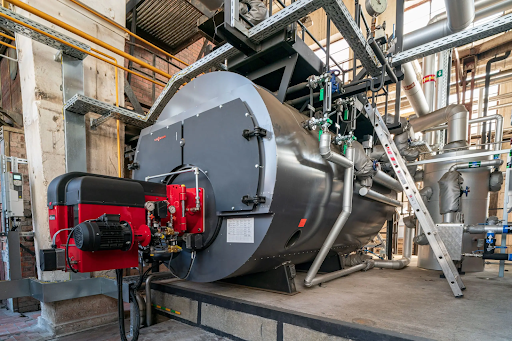In the modern industrial landscape, efficient energy utilization is paramount for businesses aiming to reduce costs and enhance sustainability. High efficiency steam boilers have emerged as a transformative technology, revolutionizing industrial heating by optimizing fuel usage, lowering emissions, and improving operational performance. This article explores the significance of high efficiency steam boilers in today’s industrial heating systems and their growing importance in meeting environmental and economic goals.
What Are High Efficiency Steam Boilers?
High efficiency steam boilers are advanced systems designed to generate steam for industrial applications while maximizing energy output from the fuel consumed. Unlike traditional boilers, which often experience significant energy losses through flue gases, high efficiency boilers incorporate cutting-edge technologies such as condensing heat exchangers and advanced combustion controls. These features allow for more complete fuel combustion, reducing wasted heat and increasing overall boiler efficiency.
A high efficiency steam boiler typically achieves efficiency ratings of over 90%, often reaching 95% or higher. This is achieved through innovations that extract more heat from the combustion process and recycle heat from exhaust gases, which traditional boilers cannot efficiently capture.
Energy Savings and Reduced Operating Costs
One of the primary benefits of high efficiency steam boilers is the significant reduction in energy consumption. Traditional steam boilers can waste up to 30% of energy through inefficient combustion and heat loss, resulting in higher operational costs. High efficiency boilers address this issue by optimizing the combustion process and recovering heat from exhaust gases, allowing them to utilize less fuel to produce the same amount of steam.
This improvement in efficiency translates directly into substantial savings in fuel costs. As energy prices continue to fluctuate, businesses can rely on high efficiency steam boilers to stabilize operating expenses, ensuring consistent profitability in the face of rising energy prices.
Environmental Benefits and Compliance
The environmental impact of industrial operations is a growing concern, and industries worldwide are under increasing pressure to reduce their carbon footprint. High efficiency steam boilers offer an effective solution by minimizing the amount of fuel required for steam generation and reducing the emission of greenhouse gases such as carbon dioxide (CO2).
By using less fuel and achieving more efficient combustion, high efficiency boilers produce fewer pollutants, contributing to cleaner air and supporting sustainability efforts. Additionally, these boilers can help industries meet increasingly stringent environmental regulations related to emissions and energy consumption, avoiding costly fines and enhancing corporate social responsibility.
Enhanced Reliability and Longevity
The design and operation of high efficiency steam boilers are not just focused on energy savings but also on improving the reliability and longevity of the equipment. With advanced monitoring and control systems, these boilers provide real-time data that helps operators optimize performance, detect potential issues before they become critical, and reduce downtime.
The robust construction of high efficiency boilers, coupled with features like corrosion-resistant materials and superior heat exchanger designs, enhances their durability. This extended lifespan results in fewer maintenance requirements and reduced capital costs over time, making high efficiency steam boilers a long-term investment for industrial operations.
Applications Across Industries
High efficiency steam boilers have widespread applications across various industries, from manufacturing and chemicals to food processing and pharmaceuticals. These boilers are essential for processes that require large amounts of steam, such as sterilization, heating, drying, and power generation.
In the food industry, for example, high efficiency steam boilers help maintain product quality and consistency while minimizing energy usage during cooking and sterilization processes. In pharmaceuticals, they ensure the precise control of temperature and pressure in processes that demand high standards of cleanliness and safety.
Furthermore, industries like textiles, paper manufacturing, and oil refineries benefit from the high steam output and low operational costs provided by these advanced systems, enhancing both productivity and competitiveness in the global market.
Future Trends and Technological Advancements
As the demand for more energy-efficient and sustainable industrial solutions grows, the development of high efficiency steam boilers continues to evolve. Future advancements may include integration with renewable energy sources, such as solar or biomass, to further reduce the reliance on fossil fuels. Smart boiler technology, utilizing Internet of Things (IoT) connectivity, could also play a significant role in monitoring and optimizing boiler performance in real-time, leading to even greater energy savings.
Additionally, the development of hybrid systems that combine high efficiency steam boilers with heat recovery solutions will further optimize energy use, enabling industries to reduce their carbon footprint and increase sustainability.
Conclusion
High efficiency steam boilers are undoubtedly revolutionizing industrial heating by providing energy savings, reducing operational costs, and minimizing environmental impact. Their ability to produce more steam with less fuel and their emphasis on reliability and longevity make them a valuable asset for industries worldwide. As technological advancements continue, high efficiency steam boilers will play an increasingly central role in shaping the future of industrial energy use, supporting both economic and environmental goals.

